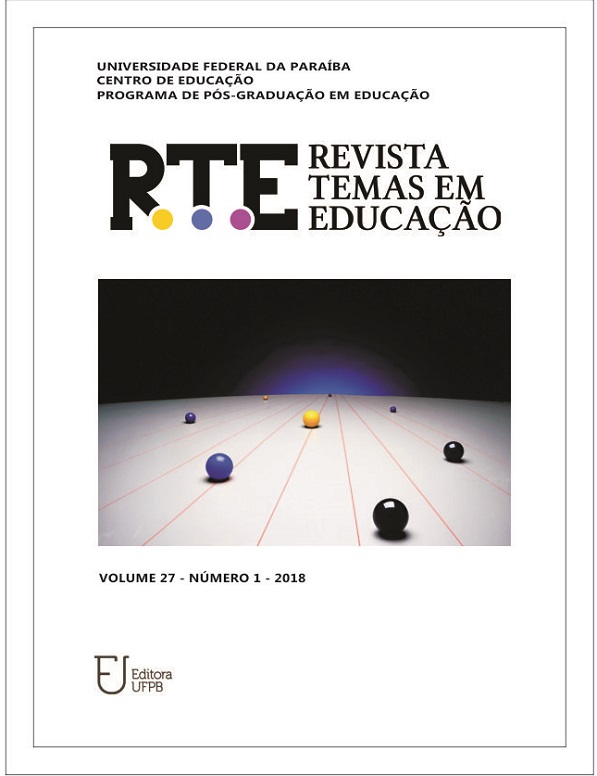SOME MARKS ABOUT POPULAR EDUCATION
SOME MARKS ABOUT POPULAR EDUCATION
DOI:
https://doi.org/10.22478/ufpb.2359-7003.2018v27n1.33512Keywords:
Popular Education, History, DiscourseAbstract
This essay aims to reflect on the discourse of emerging, constitution and re-groundingof Popular Education. Aiming the objective, the work performs an analysis of itswording based on authors like Brand茫o (2006), Carrillo (2011), Freire (1987), Guevara(2006), Streck (2012), among others. It was concluded that from boththeoretical/practical perspective and the point of view of its protagonist, strategies andeven sociopolitical interests, Popular Education has been through different historicallyand discursively settings. Then, there is no single way to understand and performPopular Education in Brazil and in Latin America.
Downloads
References
ALCÂNTARA, M. A. M. de; CARLOS, E. J. Análise Arqueológica do Discurso: uma alternativa de investigação na Educação de Jovens e Adultos (EJA). In: Intersecções: Revista de Estudos sobre Práticas Discursivas e Textuais, Jundiaí, v. 11, n. 3, p. 59-75. 2013.
BEISIEGEL, C. de R. Ensino Público e Educação Popular. In: V. P. PAIVA (Org.). Perspectivas e dilemas da Educação Popular. Rio de Janeiro, Graal, p 63-83. 1984.
BRANDÃO, C. R. O que é educação popular. 1. ed., São Paulo, Brasiliense, 110p. 2006.
CARRILLO, A. T. A. Educação Popular como prática política e pedagógica emancipadora. In: D. R. STREK; M. T. ESTEBAN (Orgs.). Educação Popular: lugar de construção social e coletiva. Petrópolis/RJ, Vozes, p. 15-32. 2013.
CARLOS, Erenildo João. Semânticas da Educação Popular. In: Conceitos: Associação dos Docentes da Universidade Federal da Paraíba, João Pessoa. p. 66-76. 2003.
FLEURI, R. M; COSTA, M. V. Travessia: questões e perspectivas da pesquisa em Educação Popular. 2. ed., Ijuí, Editora Unijuí, 148p. 2005.
FREIRE, P. Educação e atualidade brasileira. 3. ed., São Paulo, Cortez/Instituto Paulo Freire, 123p. 2003.
______, P. Pedagogia da Autonomia: saberes necessários à prática educativa. 25. ed., São Paulo. Paz e Terra, 54p. 1996.
______, P. Pedagogia do Oprimido. 17. ed., São Paulo. Paz e Terra,107p. 1987.
GUEVARA, N. Educação Popular no Século XXI. In: P. PONTUAL; T. IRELAND (Orgs.). Educação Popular na América Latina: diálogos e perspectivas. Brasília, MEC/UNESCO, p. 213-218. 2006.
LUKACS, G. Prolegômenos para uma ontologia do ser social. Trad. Lya Luft e Radnei Nascimento. 1. ed. São Paulo. Bontempo, 977p. 2010.
MEJÍA, J. M. R. Aprofundar na Educação Popular para construir uma globalização desde o sul. In: P. PONTUAL; T. IRELAND (Orgs.). Educação Popular na América Latina: diálogos e perspectivas. Brasília, MEC/UNESCO, p. 205-211. 2006.
NAHMÍAS, M. T. Os desafios da Educação Popular frente à diversidade e à exclusão. In: P. PONTUAL; T. IRELAND (Orgs.). Educação Popular na América Latina: diálogos e perspectivas. Brasília, MEC/UNESCO, p. 123-143. 261. 2006.
PAIVA, V. Introdução. In: V. P. PAIVA (Org.). Perspectivas e dilemas da Educação Popular. Rio de Janeiro, Graal, p. 15- 60. 1984.
SALOMÓN, L. O papel da sociedade civil na construção da democracia. In: P. PONTUAL; T. IRELAND (Orgs.). Educação Popular na América Latina: diálogos e perspectivas. Brasília, MEC/UNESCO, p. 19-32. 2006.
STRECK, D. R. Territórios de resistência e criatividade: reflexões sobre lugares da educação popular. In: Currículo sem fronteiras, v.12: 185-198. 2012. Disponível em: <http://www.curriculosemfronteiras.org/vol12iss1articles/streck.pdf>. Acesso: 12 de nov de 2014.
UNESCO. La educación de personas jóvenes y adultas em América Latina y el Caribe: prioridades de acción en el siglo XXI. CEAAL-CREFAL-INEA Santiago de Chile, Mayo 2000. Disponível em <http://unesdoc.unesco.org/images/0012/001214/121482so.pdf>. Acesso em: 17/12/2014.
VIEIRA PINTO, A. A evolução do conhecimento: os caracteres do conhecimento científico. In: VIEIRA PINTO, Á. Ciência e existência: problemas filosóficos da pesquisa científica. 2. ed., Rio de Janeiro: Paz e Terra. p. 11-60. 1979.
Downloads
Published
How to Cite
Issue
Section
License
Authors who publish in this journal agree to the following terms:
. Authors retain the copyright and grant the journal the right to first publication, with the work simultaneously licensed under the Licença Creative Commons Attribution that allows the sharing of the work with acknowledgment of authorship and initial publication in this magazine. . Authors are authorized to assume additional contracts separately, for non-exclusive distribution of the version of the work published in this journal (eg, publishing in institutional repository or as a book chapter), with acknowledgment of authorship and initial publication in this journal.
. Authors are permitted and encouraged to publish and distribute their work online (eg in institutional repositories or on their personal page) at any point before or during the editorial process, as this can generate productive changes, as well as increase impact and citation of the published work (See O Efeito do Acesso Livre).



















